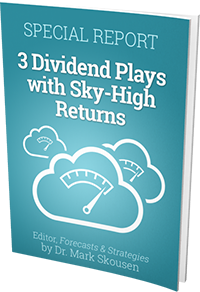Powerball fever was fun, but it’s no winning strategy for building your wealth.
The Powerball lottery garnered national attention with a record $579 million at stake, driving more and more folks that ordinarily wouldn’t care to trek to their local retailer to pluck down two or many more dollars for tickets.
If you haven’t checked your own tickets yet — spoiler-alert — according to lottery officials, two tickets were sold with the full combination of numbers for the top prize. One ticket was sold in Arizona and the other in Missouri. However, more than 8.9 million other tickets won smaller prizes by matching some of the numbers drawn along with the Powerball number.
If it makes you feel any better, while the headline number is $579 million, the real cash prize is only $379 million and the Internal Revenue Service (IRS) alone will be taking around $133 million of that from those two top winners.
Instant Losses?
While it was fun for many, buying lottery tickets makes for a lousy investment as millions of folks learn every week. But it is compelling. After all, as the advertisements go — somebody’s got to win, and it might as well be you. And the dream of instantly becoming a member of the Forbes 400 list of the richest in the world can make even the savviest investors put down their two-bucks at a local retailer.
Adding to the frenzy are the countless signs and billboards ticking up to the tens and perhaps hundreds of millions of dollars in potential winnings. Those escalating numbers don’t make it any easier to act rationally.
In fact, it might even sort of legitimize the concept of investing in the lottery — much like seeing the ticker of the S&P 500 or the Dow Jones on the signs outside brokerage companies or on the bottom of the screen of pop financial television programs.
Now you might say, there’s a world of difference between investing in the lottery and investing in the U.S. stock market. Or is there? In both cases, the average investor puts his or her money down and hopes that something good comes of it.
But in reality, there really hasn’t been much of a difference over the past several years between investing in the lottery and investing in the general stock market. Stocks, as measured by the S&P 500 or the Dow Jones, have been losers – dropping in value by more than 4% and 2%, respectively, in just the past five years alone.
But for a long time, folks have kept putting their dollars down on the stock market, much like they’ve done at the lottery ticket booth — hoping that something good will come of it. However that might be changing.
Are investors becoming less trusting about relying on the historical upward climb of the markets?
Perhaps not all investors out there are content to be losers, even if the past few months have brought some upside. According to the Investment Company Institute (ICI, www.ici.org), stock investing by the broader public — in the form of funds ranging from exchange-traded funds (ETFs) to regular and closed-end mutual funds — has been falling like a rock.
Over the past trailing four quarters, investing in stocks has become a race for the exit with more than $182 billion pulled from stock funds. The result of this exodus has been that U.S. households with stock investments have fallen to 46%, down slightly more than 13% from the recent high in 2001.
And in turn, investors are waking up to not just buying stocks and hoping something good happens, while ending up losers. Investors instead are looking for investments that pay something with some certainty.
The result shows up in the ICI data for bond funds, which during the same trailing four quarters, have seen a surge of some $547 billion flowing into the bond market. But the trouble is that for most investors, the generic bond market for the United States isn’t paying much, just like your local bankers.
But for so many investors, it’s not the return on their investment that is their newer focus, but the return of their investment. This thrust is becoming more critical as the economy is slowing in its rate of growth and there are mounting concerns about other broader issues, including the fiscal cliff, as well as the prospect of higher taxes and reduced consumer spending on the economy.
And the outlook isn’t that much brighter with a Bloomberg survey of 79 economists downgrading expectations for gross domestic product (GDP) growth in the United States for the coming year to 2.1%, down from 2.5% in the survey taken in the spring of this year.
Get Real Returns
With more and more folks beginning to seek out greater stability and trying to get some yield — the bond market isn’t doing much other than providing a haven from the malice of the general stock market.
With U.S. Treasury bills paying only about one-tenth of 1% and 10-year Treasuries barely paying more than 1% — there isn’t much to work with in building a portfolio.
The key to getting paid more on your portfolio isn’t just to buy generic Treasuries, just like investing in the general stock market doesn’t give you gains that you can count on. Instead, you have to go where the real yield is and where the credibility is getting better, rather than getting more questionable.
To follow this approach, you need to begin to ask where to find the best bond markets, where the credit ratings are getting upgrades rather than downgrades. Bonds that have suffered downgrades in the past year include the U.S. government and most of Europe.
As alternatives, look at the leading markets of Asia, and Latin America — where there are a collection of nations that didn’t have much debt, and have been growing and expanding so that governments are gaining capital rather than squandering it.
To make it easy for you, there are a select group of closed-end bond funds that own the right bonds that pay you properly. They own the exact bonds from the successful markets rather than those in jeopardy.
They include four specific funds that trade on the New York Stock Exchange (NYSE) and work for all investors. They are the AllianceBernstein Global High Income (AWF), the Templeton Emerging Markets (TEI), the Western Asset Emerging Markets (ESD) and the Pimco Strategic Global (RCS). I like all of them at current levels and they can be bought collectively.
The combination of these four funds work well together for long investment periods — providing balance in share prices, along with monthly dividends that together average more than 9.1% annually.
So far this year, returns for the four funds average more than 16.1% — or an annualized 17.8% year to date.
But don’t just look at this year. Look at these funds for the past decade. The average annual return for these four funds together is running at more than 11.2% per year. And that includes the economic and political wrangling. It also accounts for plunges that have attacked the general U.S. stock and bond markets along the way.
These four funds make for a great base for any portfolio that gets away from the failings of the general stock market, while also getting past yields of the general U.S. bond market that are below the inflation rate.
The next Powerball is set for Dec. 1 and the top prize currently is running at about $40 million to $26 million in cash. You make the call.



